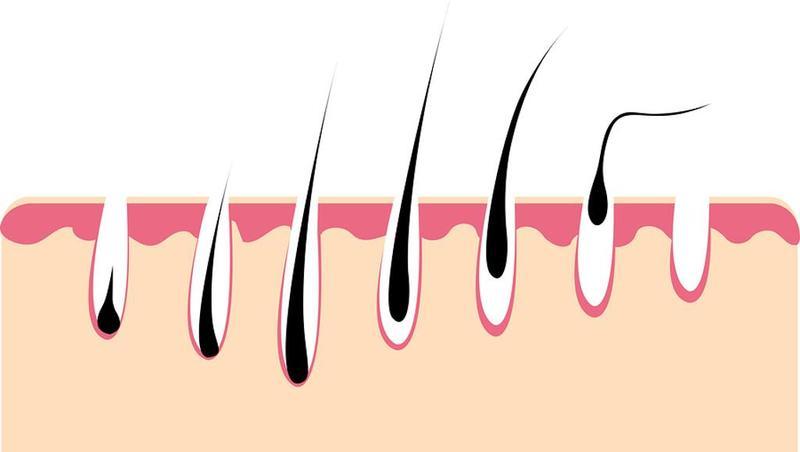Doctor tries hair-loss treatment through oriental medicine
Doctor tries hair-loss treatment through oriental medicine
When 41-year-old Ryu Yeong-ho realized that her seborrheic dermatitis was not getting any better, she decided to seek an alternative route. Her condition, a debilitating scalp condition that can ultimate lead to permanent hair loss among other complications, has recently affected an increasing number of individuals.
For Ryu, the diagnosis had been the same: all the dermatologists she visited had prescribed similar shampoos and ointments to stave off the symptoms and told her it was incurable. Discouraged, she began using the prescriptions, but each improvement would prove only temporary, and the symptoms soon returned afterwards. Her hair loss gradually worsened.
Dr. Lee Moon-won believes Ryu’s previous treatments failed because they relied only on Western methods.
“To fully get to the root of our body’s ailments and diseases, we must have a deep understanding of both Eastern and Western medicinal practices,” says Lee. “I’ve heard of many cases where symptoms have returned because Western treatments are only able to offer temporary relief to persistent scalp diseases.”
Lee, who runs a clinic bearing his own name, is no stranger to cases like Ryu’s. He has been studying the effects of hair loss for 11 years. Since 2005, he has administered over 40,000 treatments to patients with scalp disease and other hair loss-related conditions.
With a Ph.D. in human anatomy from Woosuk University, Lee is convinced both Eastern and Western medicine must be applied in order to target and treat scalp conditions. Chronic scalp disease is a condition affecting a growing number of people today. However, a surprising number let it continue its course until it gets progressively worse, in some cases leading to hair loss.
Opened in 2002 in Seoul’s affluent Cheongdam-dong south of the Han River, Lee Moon Won Clinic is the first of its kind in Korea, offering comprehensive treatment for hair loss and scalp disease. Specialists here remove pathogenesis, strengthen immunity and regenerate scalp tissue.
Ryu says that after three months of herbal remedies and herbal acupuncture, what Lee calls rh-2, her condition has shown signs of improvement, far greater than what she had experienced before.
Though the cause of hair loss can be genetic, there are other factors such as stress and a weakened immune system that come into play, most of which can be prevented if treated in time.
“Scalp disease, such as seborrheic dermatitis, can worsen hair loss in combination with other factors,” Lee says. “Seborrheic dermatitis alone cannot cause hair loss. However, when patients suffer from severe stress, this speeds up hair loss.”
“In severe cases such as folliculitis or pyocele, the damage of hair loss can be permanent,” Lee continues. “That is why it is advisable to treat these conditions in time before they lead to further complications.”
One of the strongest merits prevalent in Korean oriental medicine is that there are not any significant side effects. Furthermore, treatments are long-lasting and are prescribed on an individual basis.
For 33-year-old Kim Hae-suk, her hair loss was the result of prolonged exposure to sunlight on a trip she took to Jeju Island.
“After my friends and family began noticing that I had significant balding around my crown, I became increasingly self-conscious and began stressing out,” Kim says. This, in turn, only exacerbated the problem.
After six rounds of oriental herbal medicines and acupuncture at Lee’s clinic, she says much of her hair loss has been recovered.
In the case of scalp diseases, Western medicine tends to focus on the treatment of symptoms by applying anti-inflammatory, antibiotic, sebum restrainer and antihistaminic medicines.
“Such methods are highly dependent on chemical ingredients,” asserts Lee. “Symptoms are likely to reoccur as soon as the patient is taken off the medication.”
According to Lee, oriental medicine is more focused on strengthening the immune system. It is also less invasive, he says. After isolating the source of an individual’s hair loss, doctors at Lee Moon Won prescribe customized herbal medicine treatments.
But this does not mean it is a quick fix.
“Abnormality of energy metabolism, poor blood circulation, liver disorder and kidney malfunction, low metabolism can all contribute to hair loss,” says Lee. “Therefore, it’s essential to boost the body’s own defenses to prevent hair loss and cure scalp ailments.”
On average, the Lee Moon Won Clinic combines three to four different oriental treatment methods to treat scalp diseases or hair loss. The most popular and common combination is yakchim (scalp injection), external application (application or spraying of medicine to scalp), and scalp massage, which entails thorough cleansing and strengthening of the scalp.
Doctors say chronic scalp diseases such as seborreic dermatitis or folliculitis show improvements after three to four months of treatment, and can be completely cured in six months. The clinic is encouraging not just in treatment – it reimburses taxi fare within Seoul on first visit with receipt.
by Yonhap News
Be the first to post a message!
